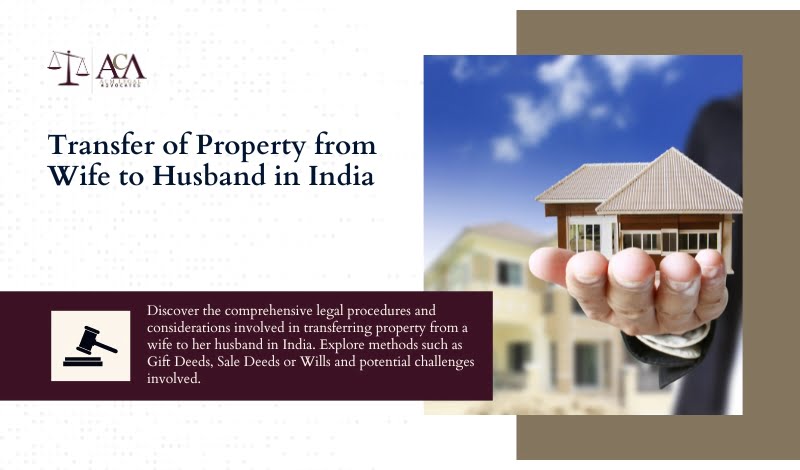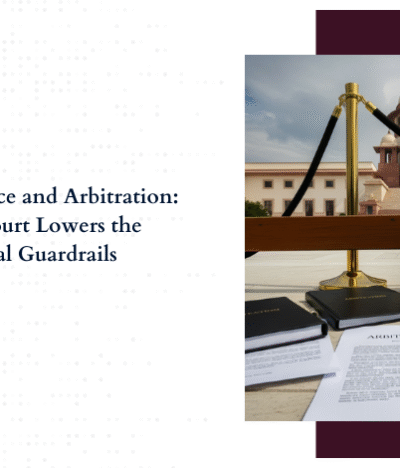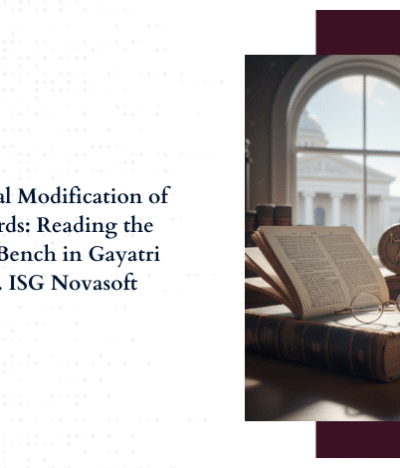What is the procedure for transferring property from wife to husband in India? The process of transferring property from wife to husband involves several legal steps and considerations. In India, spouses often seek to transfer property between each other for various reasons, including consolidation of assets, estate planning or financial management.
Understanding the procedure and legal framework governing the transfer of property from wife to husband is crucial to ensure compliance with the law and to safeguard the interests of both parties. Each method to transfer property requires drafting the appropriate legal document, obtaining witnesses, paying stamp duty and registering the deed with the sub-registrar’s office to complete the transfer.
How of Transfer of Property from Wife to Husband in India
The procedure for transferring property from a wife to her husband in India involves a meticulous process governed by legal norms and regulations. This process encompasses various steps, including drafting and executing the appropriate legal document, such as a gift deed, sale deed or a will. In this article, we’ll delve into the methods of transfer of property from wife to husband, exploring its legal intricacies and procedures.
1. Transfer Through Gift Deed
A gift deed allows a wife to transfer her property to her husband without any monetary exchange, formalizing the transfer legally and irrevocably.
1.1. Drafting the Gift Deed
The wife (donor) drafts a Gift Deed stating her intention to gift the property to her husband (donee). The deed should include details of the property, the relationship between the donor and the donee, and a clear declaration of the gift without any monetary consideration. The Gift Deed must be signed by the donor in the presence of at least two witnesses, also the deed shall be singed by the witnesses as well.
1.2. Acceptance by the Donee
The husband must accept the gift during the lifetime of the wife.
1.3. Stamp Duty
Pay the applicable stamp duty on the Gift Deed. The rate varies by state, but there are often concessions for transfers between close relatives, including spouses.
In Karnataka Properties valued under Rs. 45 lakhs incur a 3% fee, those between Rs. 45 lakhs and Rs. 90 lakhs incur a 2% fee, and properties over Rs. 90 lakhs incur a 5% fee.
In Delhi, stamp duty and transfer duty are 4% of the circle rate for female donees, 6% for male donees, and 5% for joint possession.
1.4. Registration
Visit the local sub-registrar’s office with the donor, donee, witnesses, and the the Gift Deed. Submit the deed for registration along with required documents such as proof of identity, property papers and stamp duty receipt. The sub-registrar will verify the documents and register the Gift Deed.
1.5. Required Documents
- Drafted Gift Deed
- Proof of Identity
- Property Documents
- Encumbrance Certificate
- No Objection Certificate (if applicable)
- Proof of Payment of Stamp Duty
2. Transfer Through Sale Deed
A sale deed allows a wife to transfer ownership of her property to her husband through a legally binding document, involving mutual agreement on the sale price and registration of the deed with the local Sub-Registrar.
2.1. Agreement to Sell
Both the wife (seller) and the husband (buyer) should mutually agree on the terms of the sale, including the sale price.
2.2. Draft a Sale Deed
The sale deed must contain details about the property, the agreed sale price, the date of transfer, and other terms and conditions. Both parties must sign the sale deed in the presence of two witnesses.
2.3. Payment of Stamp Duty
The husband (buyer) shall pay the stamp duty. The amount varies depending on the property’s location and its value. Payment is made at the local sub-registrar’s office.
2.4. Registration of Sale Deed
Visit the local Sub-Registrar’s office to register the sale deed. Both parties, along with witnesses, must be present. Submit the sale deed along with proof of payment of stamp duty, identity proof, and other required documents. Pay the registration fee, which is typically a percentage of the property value and varies by state. The Sub-Registrar will verify the documents and the identities of the parties involved. Once satisfied, the sale deed is officially registered.
2.5. Mutation of Property:
Apply for mutation of the property in the local municipal records to reflect the new ownership. Submit a copy of the registered sale deed along with an application for mutation.
3. Transfer Through Will
Transferring property through a will allows a wife to designate her husband as the beneficiary of her property upon her death. This document ensures that the property is transferred to the husband according to her wishes.
3.1. Drafting the Will
The wife (testator) drafts a Will specifying that upon her death, her property should be inherited by her husband. The Will should include clear details of the property, the beneficiary (husband), and any conditions of transfer. The Will must be signed by the testator in the presence of at least two witnesses, who should also sign the document. The witnesses should not be beneficiaries of the Will. Registering the Will at the local sub- registrar’s office is not mandatory but it adds an extra layer of authenticity. The sub-registrar verifies and registers the Will, involving a nominal fee.
3.2. Declaration of Title Suit
For the declaration of title suit, the husband files a suit in a civil court to claim his rightful ownership of the property. To support his case, he must present documentary evidence, including the will, title deed, and other relevant documents that establish his legal claim. The court evaluates this evidence along with witness testimonies. If the court finds the evidence convincing, it may issue a declaration confirming the son’s title to the property.
3.3. Probate Process (If Required)
Upon the wife’s death, if required the husband apply for probate in a court of law. Submit the original Will, death certificate of the testator and a petition for probate to the relevant court. The court examines the Will, verifies its authenticity and may call witnesses to testify. If the court is satisfied, it grants probate, officially validating the Will.
3.4. Mutation of Property
Apply for the mutation of the property at the local municipal authority. Submit the death certificate, a copy of the Will, latest property tax receipts, identity proof and proof of relationship.
Common Challenges of Transferring Property Wife to Husband
Navigating the transfer of property from wife to husband in India poses several common challenges as follows:
Legal Formalities and Documentation
One of the most significant challenges to transferring property from wife to husband is ensuring all legal formalities and documentation are correctly completed. This includes drafting precise legal documents such as a Gift Deed, Sale Deed or Will, having them signed by the required witnesses, and registering them with the appropriate authorities. Any errors or omissions in these documents can lead to delays, legal disputes or even invalidation of the transfer.
Stamp Duty and Registration Fees
Another challenge is the cost associated with stamp duty and registration fees, which vary from state to state in India. While there are concessions for transfers between close relatives, the costs can still be substantial. Ensuring the correct valuation of the property and paying the appropriate fees are critical steps. Failure to comply with these financial requirements can result in penalties and complications during the registration process.
Disputes Among Heirs or Beneficiaries
Family disputes can complicate the process of transferring property from wife to husband. Even if the wife intends to transfer the property to her husband, other heirs or beneficiaries might contest the transfer, especially if they believe they are entitled to a share. Such disputes can lead to lengthy and costly legal battles, requiring mediation or intervention by the courts, which can significantly delay the transfer process.
Lack of Awareness and Legal Guidance
Many individuals lack awareness of the legal procedures and requirements for transferring property, which can lead to mistakes and misunderstandings. Without proper legal guidance, the wife and husband might overlook important steps or fail to comply with local laws, resulting in invalid documents or rejected applications. Engaging a lawyer can help navigate these complexities.
Conclusion
Understanding how to transfer property from wife to husband in India involves navigating a legal process governed by various methods such as Gift Deeds, Sale Deeds or Wills. Each method requires careful consideration of legal formalities, documentation, stamp duty and registration procedures. However, common challenges such as family disputes, financial costs and lack of legal awareness can complicate the transfer process. Therefore, it is crucial for individuals undertaking such transfers to seek proper guidance to ensure compliance with the law and safeguard the interests of all parties involved.
Explore Property Transfer Services with ACM Legal
With ACM Legal, property transfers between spouses are facilitated with expertise, ensuring compliance with legal requirements and providing ease throughout the process. Our team of experienced lawyers specializes in navigating the intricate legal landscape surrounding property transfers, guaranteeing that all documentation is meticulously prepared and submitted.
FAQs
1. How to transfer property from wife to husband in India?
To transfer property from wife to husband in India, the wife can choose one of the following legal methods: through a Gift Deed, Sale Deed or a Will. For a Gift Deed, the wife drafts a document stating her intention to gift the property to her husband, which requires acceptance by the husband, payment of stamp duty, and registration at the local sub-registrar’s office. In the case of a Sale Deed, both parties agree on terms, draft the deed, pay stamp duty, and register it with the sub-registrar. Alternatively, a wife can designate her husband as the beneficiary of her property through a Will, which involves drafting the document, probate process if necessary, and mutation of property records.
2. Which documents are crucial for the property transfer process between spouses?
The following documents are required to transfer property from wife to husband:
- Title Deed
- ID Proof
- Address Proof
- Marriage Certificate
- Encumbrance Certificate
- Power of Attorney (if applicable)
- Transfer Deed
- Stamp Papers
- Registration Fees Receipt
3. What are the common challenges in transferring property from wife to husband?
The following common challenges can be faced in transferring property from wife to husband
- Legal Requirements and Documentation
- Consent and Agreement
- Family Disputes
- Mortgage or Loan Issues
- Inheritance and Succession Laws
- Verification of Property Title
- Stamp Duty and Registration Fees
- Local Regulations and Authorities
4. What are the conditions for transferring a mortgaged property to a spouse?
Transferring a mortgaged property to a spouse typically involves several conditions. Firstly, the lender’s consent is crucial, as the mortgage agreement likely includes clauses regarding the transfer of ownership. Additionally, the spouse acquiring the property may need to meet the lender’s eligibility criteria for assuming the mortgage, including creditworthiness and financial stability. Moreover, the transfer may require the payment of outstanding dues or renegotiation of loan terms.
5. Can a wife revoke the transfer of property after it has been completed?
Once a transfer of property from a wife to her husband has been completed, it is generally irrevocable, especially if the transfer was done through a legally binding deed such as a gift deed or will. These deeds are executed with the intention of permanently transferring ownership rights from one party to another. However, there are limited circumstances where revocation may be possible, such as if the transfer was made under fraud, coercion or undue influence, or if there are legal grounds for challenging the validity of the transfer.
Explore More Property Transfers
- Father to Son
- Father to Daughter
- Mother to Son
- Mother to Daughter
- Husband to Wife
- Father in Law to Son in Law
- Father in Law to Daughter in Law
- Mother in Law to Son in Law
- Mother in Law to Daughter in Law
- Grandfather to Grandson
- Grandmother to Grandson
- Brother to Brother
- Brother to Sister
- Sister to Brother






